

It is important to know how stress is triggered and how it affects us so that we can learn to manage stress well, even use it to our advantage, and stay healthy. How stress affects your brain - Madhumita Murgia. The Teenage Brain The Stress Response and the Adolescent Brain. Summary: Stress and The Brain. 6 Common Triggers of Teen Stress. Teenage Stress. Teens are under more stress today than ever before.
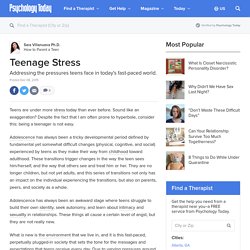
Sound like an exaggeration? Despite the fact that I am often prone to hyperbole, consider this: being a teenager is not easy. Adolescence has always been a tricky developmental period defined by fundamental yet somewhat difficult changes (physical, cognitive, and social) experienced by teens as they make their way from childhood toward adulthood. These transitions trigger changes in the way the teen sees him/herself, and the way that others see and treat him or her.
They are no longer children, but not yet adults, and this series of transitions not only has an impact on the individual experiencing the transitions, but also on parents, peers, and society as a whole. article continues after advertisement Adolescence has always been an awkward stage where teens struggle to build their own identity, seek autonomy, and learn about intimacy and sexuality in relationships. So, why are teens so “angsty” today? What can parents do? What Are the Effects of Cyberbullying? Bullying—including cyberbullying—causes significant emotional, psychological, and physical distress.
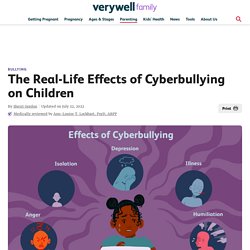
Just like any other victim of bullying, cyberbullied kids experience anxiety, fear, depression, and low self-esteem. They also may experience physical symptoms, mental health issues, and struggle academically. Here's a closer look at the emotional, mental, and physical effects of cyberbullying. Emotional Effects of Cyberbullying Not surprisingly, cyberbullying is a significant stressor in a young person's life. If you notice a change in your child's mood, don't hesitate to reach out to their healthcare provider for evaluation and support. Your child may feel a range of emotions if they are the target of a cyberbully.
Humiliation Because cyberbullying occurs in cyberspace, online bullying feels permanent. Summary: Triggers of Stress. Stress and teenagers - ReachOut Parents. It’s very common for young people to feel stressed out from time to time.
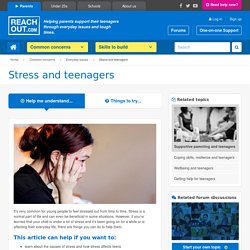
Stress is a normal part of life and can even be beneficial in some situations. However, if you’re worried that your child is under a lot of stress and it’s been going on for a while or is affecting their everyday life, there are things you can do to help them. This article can help if you want to: Summary: Signs of Stress. The Effects of Long-term Stress on Adolescents. Effects on cognitive function: The area of the brain that is the most affected is the prefrontal cortex.
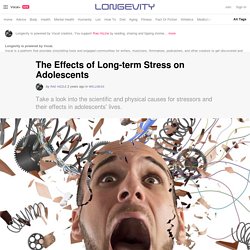
Eating Disorders and Stress. Stress affects everyone on a daily basis.
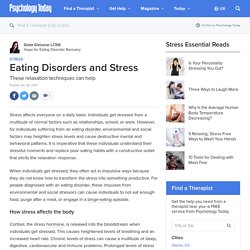
Individuals get stressed from a multitude of normal factors such as relationships, school, or work. Stress May Trigger Mental Illness and Depression In Teens - Depression Center - EverydayHealth.com. Your teenage years should be among the best times of your life.
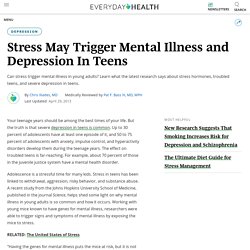
But the truth is that severe depression in teens is common. Up to 30 percent of adolescents have at least one episode of it, and 50 to 75 percent of adolescents with anxiety, impulse control, and hyperactivity disorders develop them during the teenage years. The effect on troubled teens is far-reaching. For example, about 70 percent of those in the juvenile justice system have a mental health disorder. Adolescence is a stressful time for many kids. RELATED: The United States of Stress "Having the genes for mental illness puts the mice at risk, but it is not enough to cause mental illness," says Akira Sawa, MD, PhD, a psychiatry professor and director of the schizophrenia center at Johns Hopkins Medical Center in Baltimore and lead researcher on the study.
How Stress Triggers Mental Illness in Young Adults "I think most clinicians would agree that adolescent stress can cause major changes in adult brains," Dr. Stress Coping and Disturbed Eating Attitudes in Girls. Summary: Effects of Stress. Coping with teenage STRESS. How to help children and teens manage their stress. In the short term, stress can push a child to practice for her piano recital or inspire a teen to study when he’d rather be out with friends.
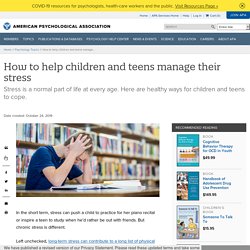
But chronic stress is different. Left unchecked, long-term stress can contribute to a long list of physical and mental health problems. Prolonged stress can cause high blood pressure, weaken the immune system and contribute to diseases such as obesity and heart disease. It can also lead to mental health problems such as anxiety and depression—disorders that are becoming more common in youth. In a 2018 study, researchers analyzed data from the National Survey of Mental Health and found that rates of anxiety and depression had increased in kids ages 6 to 17, from 5.4% in 2003 to 8.4% in 2011-12. Teens and Stress: Practical Coping Skills. We all experience stress at some point in our lives.
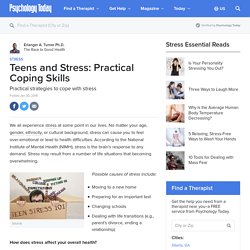
No matter your age, gender, ethnicity, or cultural background, stress can cause you to feel over-emotional or lead to health difficulties. According to the National Institute of Mental Health (NIMH), stress is the brain's response to any demand. Stress may result from a number of life situations that becoming overwhelming. article continues after advertisement Source: A to Z of coping strategies.
Summary: Coping Strategies.